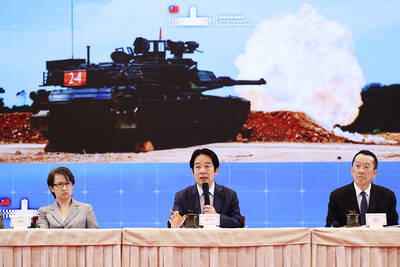The 7th Taishin Arts Award (第七屆台新藝術獎) ceremony was held on Saturday afternoon at Taishin Bank’s swanky building on Renai circle in a spartan ceremony befitting Taiwan’s troubled economy.
Capital Ballet Taipei’s (台北首督芭蕾舞團) Surround (井) won the top award in the performance arts category and Wang Jun-jieh’s (王俊傑) Project David III: David’s Paradise (大衛計畫第三部:大衛天堂) took the first prize in visual arts.
Each award comes with a purse of NT$1 million.
The Taishin Arts Award is an annual competition that recognizes artistic excellence in two categories: visual and performance art. There is also a special jury prize. The jury, consisting of journalists, academics and art professionals from Taiwan and abroad, selected the nominees from performances and exhibitions that premiered in Taiwan last year.
Commonplace objects such as tables and boxes were employed in Surround as a means of investigating spatial and temporal relationships. The judges cited its accessibility to audiences and the emotional intensity of the show’s dancers as reasons why it took top honors.
Wang’s five-screen video installation Project David III: David’s Paradise was created in memory of Wang’s deceased friend and contemplates the vicissitudes of life. Art critic and jury member Chen Tai-song (陳泰松) said that the work, with its slow-moving frames that merge into a seamless whole, “leaves a lasting impression” on viewers and is “a classic that later artists will emulate.”
The jury award, which included a NT$300,000 prize, went to Wu Tien-chang (吳天章) for his staged photography series Shock. Shot (懾˙相).
The remaining short-listed artists included Chou Yu-cheng (周育正) for his work Superb Superficialness (很膚淺), Pan Ta-chien (潘大謙) for Flashover (閃燃 — 潘大謙個展) and Taiwan Field Factory (台灣田野工場) for Art Installation in Tree Valley Park’s Public Space (樹谷園區公共空間藝術設置).
Shakespeare’s Wild Sisters Group (莎士比亞的妹妹們的劇團) was nominated twice in the performance art category for Sylvia Plath (給普拉斯) and Listen to Me, Please (請聽我說—豪華加長版).
Other finalists include the Death and Love of My Mother — The Reminiscence of the Diva Daughter (凍水牡丹 — 廖瓊枝與臺灣國家國樂團) by National Chinese Orchestra (臺灣國家國樂團), Ju Percussion Group’s (朱宗慶打擊樂團) Percussion Happens Daily (擊樂進行式), The Sky Crisis (飛天行動─ 島國預言瘋狂喜劇) by the Party Group (同黨劇團), M.O.V.E. Theatre’s (動見体劇團) Fable to Be, or Not to Be (漢字寓言:未來系青年觀點報告), The Village (寶島一村) by Performance Workshop (表演工作坊), Reflex (Double C舞團—反射) by Wu Chun-hsien (吳俊憲) and Chou Shu-yi’s (周書毅) Visible City, People Filled with Air (看得見的城市—人充滿空氣).
MOCA, Taipei is currently holding an excellent exhibition on this year’s featuring contributions from each nominee.
The 7th Taishin Arts Award Exhibition runs until May 24 at the Museum of Contemporary Art, Taipei (MOCA, Taipei), 39 Changan W Rd, Taipei City (台北市長安西路39號). Call (02) 2552-3721 for more information. The museum opens from 10am to 6pm, Tuesday through Sunday, and is closed on Mondays. On the Net: www.mocataipei.org.tw.

For many centuries from the medieval to the early modern era, the island port of Hirado on the northwestern tip of Kyushu in Japan was the epicenter of piracy in East Asia. From bases in Hirado the notorious wokou (倭寇) terrorized Korea and China. They raided coastal towns, carrying off people into slavery and looting everything from grain to porcelain to bells in Buddhist temples. Kyushu itself operated a thriving trade with China in sulfur, a necessary ingredient of the gunpowder that powered militaries from Europe to Japan. Over time Hirado developed into a full service stop for pirates. Booty could

Politically charged thriller One Battle After Another won six prizes, including best picture, at the British Academy Film Awards on Sunday, building momentum ahead of Hollywood’s Academy Awards next month. Blues-steeped vampire epic Sinners and gothic horror story Frankenstein won three awards each, while Shakespearean family tragedy Hamnet won two including best British film. One Battle After Another, Paul Thomas Anderson’s explosive film about a group of revolutionaries in chaotic conflict with the state, won awards for directing, adapted screenplay, cinematography and editing, as well as for Sean Penn’s supporting performance as an obsessed military officer. “This is very overwhelming and wonderful,” Anderson

Another moment of the US making permanent concessions for transient gains, which appears to be longstanding US policy with the People’s Republic of China (PRC), occurred last week when President Donald Trump announced that weapons sales to Taiwan would be delayed in order to arrange a meeting with the PRC dictator Xi Jinping (習近平). There were “concerns among some in the Trump administration that greenlighting the weapons deal would derail Trump’s coming visit to Beijing, according to US officials,” the Wall Street Journal reported. It attributed the suspension of the weapons sale to pressure from Xi. While some might shrug

Jacques Poissant’s suffering stopped the day he asked his daughter if it would be “cowardly to ask to be helped to die.” The retired Canadian insurance adviser was 93, and “was wasting away” after a long battle with prostate cancer. “He no longer had any zest for life,” Josee Poissant said. Last year her mother made the same choice at 96 when she realized she would not be getting out of hospital. She died surrounded by her children and their partners listening to the music she loved. “She was at peace. She sang until she went to sleep.” Josee Poissant remembers it as a beautiful